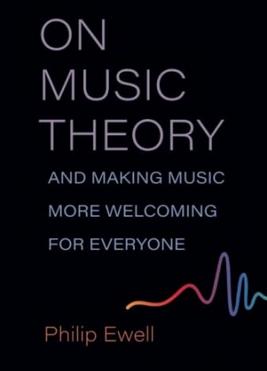On Music Theory and Making Music More Welcoming for Everyone
Soft / Music Magazines
9-06-2023

Since its inception in the mid-twentieth century, American music theory has been framed and taught almost exclusively by white men. As a result, whiteness and maleness are woven into the fabric of the field, and BIPOC music theorists face enormous hurdles due to their racial identities. In On Music Theory, Philip Ewell brings together autobiography, music theory and history, and theory and history of race in the United States to offer a black perspective on the state of music theory and to confront the field’s white supremacist roots.
Over the course of the book, Ewell undertakes a textbook analysis to unpack the mythologies of whiteness and western-ness with respect to music theory, and gives, for the first time, his perspective on the controversy surrounding the publication of volume 12 of the Journal of Schenkerian Studies. He speaks directly about the antiblackness of music theory and the antisemitism of classical music writ large and concludes by offering suggestions about how we move forward. Taking an explicitly antiracist approach to music theory, with this book Ewell begins to create a space in which those who have been marginalized in music theory can thrive.
home page:
https://goo.su/M4sbEUG
Over the course of the book, Ewell undertakes a textbook analysis to unpack the mythologies of whiteness and western-ness with respect to music theory, and gives, for the first time, his perspective on the controversy surrounding the publication of volume 12 of the Journal of Schenkerian Studies. He speaks directly about the antiblackness of music theory and the antisemitism of classical music writ large and concludes by offering suggestions about how we move forward. Taking an explicitly antiracist approach to music theory, with this book Ewell begins to create a space in which those who have been marginalized in music theory can thrive.
home page:
https://goo.su/M4sbEUG
Related articles
Soft / Music Magazines
20-12-2022
Directly addressing the underrepresentation of Black composers in core music curricula, Expanding the Canon: Black Composers in the Music Theory Classroom aims to both demonstrate why diversification is badly needed and help faculty expand their teaching with practical, classroom-oriented lesson plans that focus on teaching music theory with music by Black composers.
This collection of 21 chapters is loosely arranged to resemble a typical music theory curriculum, with topics progressing from basic to advanced and moving from fundamentals, diatonic harmony, and chromatic harmony to form, popular music, and music of the twentieth and twenty-first centuries.
Soft / Music Magazines
16-09-2022
Learn music theory today with the simplest, fastest and most effective method available. With this comprehensive course, you will master the essentials of music theory in a fraction of the time it would take using traditional methods.
Learn music theory in the easiest and fastest way possible! Avoid the long, boring hours of practice and lessons with thousands of exercises. This course is a short and sweet way to learn about music theory. At the end of this course, you will have learned everything there is to know about melody and rhythm, chords, scales and intervals to start making your music.
Soft / Music Magazines
4-05-2022
Milton Babbitt (1916-2011) was, at once, one of the century's foremost composers and a founder of American music theory. These two aspects of his creative life--"thinking in" and "thinking about" music, as he would put it--nourished each other. Theory and analysis inspired fresh compositional ideas, and compositional concerns focused theoretical and analytical inquiry. Accordingly, this book undertakes an excavation of the sources of his theorizing as a guide to analysis of his music.
Soft / Music Magazines
9-12-2021
This book is a comprehensive examination of the conception, perception, performance, and composition of time in music across time and culture. It surveys the literature of time in mathematics, philosophy, psychology, music theory, and somatic studies (medicine and disability studies) and looks ahead through original research in performance, composition, psychology, and education. It is the first monograph solely devoted to the theory of construction of musical time since Kramer in 1988, with new insights, mathematical precision, and an expansive global and historical context.